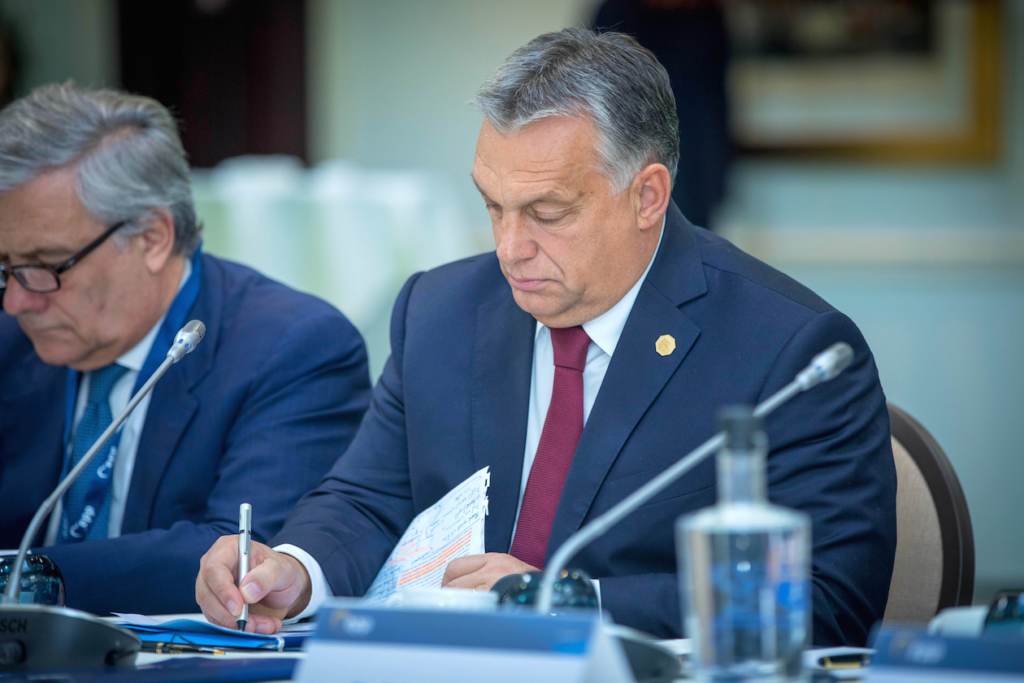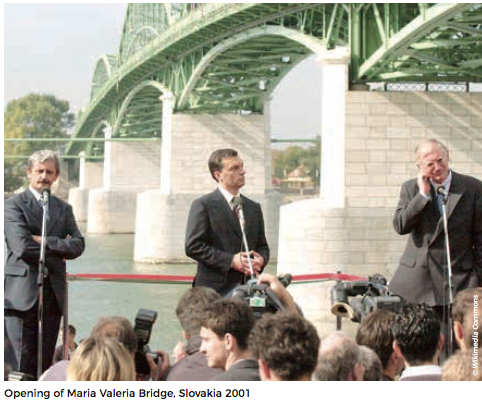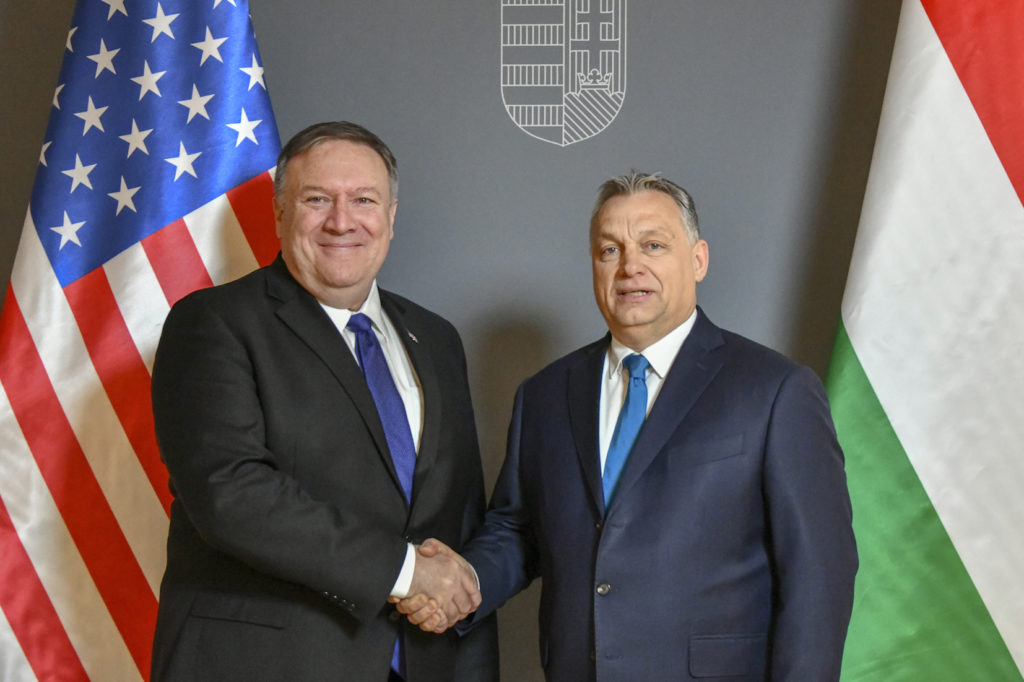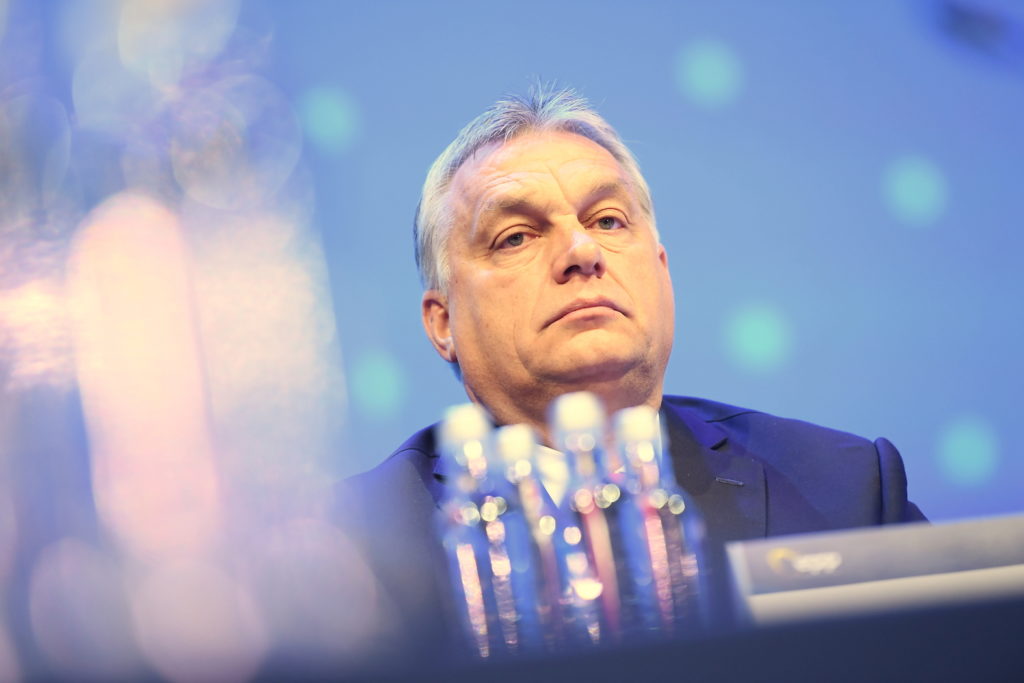The irresistible rise of Europe’s “Enfant Terrible”
In the summer of 1989, hundreds of thousands of people had gathered in Heroes’ Square in Budapest for the ceremonial reburial of Imre Nagy along with other heroes of the 1956 uprising that was brutally crushed by Soviet troops.
At one point, a bearded 26 year-old man gave a short but fiery speech in which he called for free elections and openly demanded that Soviet troops be withdrawn.
He became instantly famous at home and abroad.
That young man was Viktor Orbán, a recent law graduate from the prestigious Eötvös Loránd University in Budapest.
Viktor Orbán was born on 31 May 1963 in Székesfehérvár, Hungary’s medieval capital. His father, an agricultural engineer, became a member of the Hungarian Socialist Workers Party while his mother was an educator and speech therapist.
The family was poor and until the early 1970s didn’t even have access to running water; in fact Orbán has said that he first used an indoor bathroom with hot water when he was fifteen.

However, he was an exceptional student and after high school and a year in the army, he attended István Bilbó, a college in Budapest where dissenting ideas were tolerated and even protected. And the source for this protection was the support of an unlikely figure : George Soros, the Hungarian-American millionaire and financier who set up a foundation to promote democracy in Hungary in 1984.
His Open Society Foundation (OSF) aimed to counter communist dictatorship as well as the nationalism that he feared would reappear after the fall of communism.
Soros visited the college in 1985 and offered his full support to Orbán and his fellow students who founded “Fiatal Demokraták Szövetsége” or Federation of Young Democrats, which would later become known as Fidesz.
In 1988, Orbán began work at the Central European Research Group which was funded by the Soros Foundation. One year later, he obtained a grant from that foundation to study political science at Oxford University.

However, his stay in England proved to be a short one and only four months later, he returned to Hungary to enter politics.
At the time, Fidesz presented itself as a liberal and libertarian party of young dissidents advocating for foreign investment and privatization.
His party having won twenty seats in the National Assembly, Orbán decided to become a member of parliament.
However, as a result of internal disagreements regarding alliances with other parties, several hundred members broke away, leaving Orbán as the head of the party.
In the following elections in 1994, Fidesz lost two seats and became the smallest party in parliament.
This situation led Orbán who was brimming with ambition, charisma and tactical skill to re-think the infrastructure of the party.
He recognized the need for the media and the press in the creation of an effective apparatus as well as the support of “big capital”.
Consequently, Fidesz shifted away from its original centre-right and pro-European integration platform toward right-wing national conservatism, skillfully exploiting a hurt national pride and public frustration with corruption.
By exploiting the highly sensitive “national question” which concerns the trauma caused by the 1920 Treaty of Trianon, through which Hungary lost two-thirds of its historic territory and over 3 million Hungarians found themselves living in foreign states, Fidesz gradually became the main political force in Hungary.
Fidesz won a parliamentary majority in 1998 and Orbán, at thirty-five, became the youngest freely elected Prime Minister in the history of Hungary.
Yet, despite maintaining a growing economy, Fidesz lost the 2002 and 2006 elections to a coalition of left-of-centre parties and Orbán spent the next eight years as the leader of the opposition.
At one point, even his position as the leader of Fidesz briefly came under question, although no party member was up to the challenge of taking over from him.

In the meantime, the Social-Liberal coalition demonstrated its ineptitude at governing the country.The economy practically collapsed and Hungary was on the verge of default following the 2008 financial crisis.
The International Monetary Fund finally provided a bail-out package but demanded severe austerity measures in return.
However, a large section of the Hungarian public, weary of the political bickering, again turned to Orbán and his party for salvation.
The year 2010 proved a turning point in Viktor Orbán’s career. He led Fidesz back into power, winning a two-thirds parliamentary majority.
Faced with a divided and discredited opposition, he proceeded to fill all positions of state power with trusted supporters. Also, in the next few years, he passed several thousand pages of laws.
In 2011, he even introduced an entirely new constitution which passed in only nine days.
He levied taxes on foreign companies and put an end to the country’s hybrid, public-private pension system. He nationalized about twelve billion dollars in assets and cut the number of MPs nearly in half; a move popular with most Hungarians.
However, opposition politicians and investigative journalists maintain that Orbán has become phenomenally wealthy through companies that are registered in the names of family members and friends – a pattern familiar throughout the post-Communist world.
Illiberal Democracy
Every summer, Viktor Orbán has given a speech akin to a state-of-the-union address in the hills of Băile Tuşnad in Transsylvania.
This region which was ceded to Romania in 1920 is home to ethnic Hungarians who were stranded there after the Treaty of Trianon.
In 2014, he argued that, after the financial collapse of 2008, the world had awoken to a new reality, as dramatic as that of 1945 or 1990, except that this time no one realized it.
In a critique of Western liberalism, he said that the idea that one could do whatever one wanted as long as it didn’t infringe on the freedoms of others had resulted not in justice but in the strong dominating the weak.
“The Hungarian nation is not simply a group of individuals but a community that must be organized,” he said.
“And so, in this sense, the new state that we are constructing in Hungary is an illiberal state, a non-liberal state.”
In the summer of 2018, had refined his idea. “There is an alternative to liberal democracy: it is called Christian democracy,” he said at the gathering.

“And we must show that the liberal élite can be replaced with a Christian-democratic élite.” Orbán offered some clarification. “Liberal democracy is in favour of multiculturalism, while Christian democracy gives priority to Christian culture,” he said. “Liberal democracy is pro-immigration, while Christian democracy is anti-immigration.”
By early 2015, the Orbán government had lost its supermajority, and the prime minister resorted to using immigration as a key issue to regain support.
The migrant and refugee crisis, which reached its peak that year, proved a godsend for that project.
Hungary received 174,000 asylum applications in 2015 alone—or 1,770 applicants per 100,000 residents, the highest rate of any European country.
Sharply opposed to the influx of migrants, Orbán ordered the building of a 175 kilometre-long fence along the border with Serbia to keep them out, and later one along the border with Croatia.
He explained his position regarding immigration first in Hungary and then across the postcommunist states of Central and Eastern Europe by emphasizing two predominant elements of Hungarians’ self-image, both consequences of the Treaty of Trianon: the myth of the victim and the will to survive.
As a result, Fidesz’s poll ratings and Orbán’s popularity rose sharply. He achieved international notoriety as a sort of pioneer and role model for nationalists.
Even critics of the government’s harsh treatment of asylum seekers admitted that Orbán realized before most EU leaders that borders had to be controlled before a relocation plan for migrants could be agreed upon.
However, the effects of Orbán’s demagogy in Central and Eastern Europe should not be underestimated.
It is largely due to his influence that three other post-communist EU states, namely the Czech Republic, Poland and Slovakia have emerged as a nationalistic group, blocking European integration.
Russia, through its expansive strategy and China have shown much interest in this credo, as have Tukey and India.
Meanwhile, in Western Europe, Orbán boasts numerous admirers in Germany, Austria, France, and the Netherlands.
Over the past eight years, Orbán has pioneered a new model of what some Hungarian and other European analysts describe as a “half democracy in decline” or a “soft autocracy,” merging crony capitalism with right-wing rhetoric.
This is a formula that could lead to a one-party state committed to rooting out anti-Christian values, with no effective checks and balances, controlling the media and a network of oligarchs who owe their fortunes to government contracts.
He has rejected outright all accusations about the alleged impropriety of the sources of his allies’ enrichment, but opposition speakers in parliament repeatedly complain that he has become not only the most powerful but also the richest man in Hungary.
Be that as it may, Viktor Orbán remains a fighter who thrives on confrontation. And he holds two great cards – being in the frontline of Muslim immigration and a fragile economy.
Neither a weak and split opposition in Hungary nor warnings from the EU and human-rights organizations threaten his grip on power…for now.
Some excerpts from Viktor Orban’s declarations :
« The migration crisis affecting Europe has in fact broadened to become civilizational crisis, and “the East has come to the West”.
« Europe is politically deluded if it thinks that people arriving from the Islamic world do not bring with them the laws, customs and conflicts that have existed in their culture for centuries. »
“Western Europe’s modern-day warriors for integration believe that there’s no reason why anyone who wants to go to France or Germany and who wants a French or German standard of living shouldn’t immediately become French or German. Today the Brussels elite lives in this bubble.” Contrary to the belief in Brussels, in reality migrants are coming because they want French, German or Hungarian standards of living, but also want to live according to their own rules ».
« The Hungarian position is that help should be taken to where it is needed, because this is the appropriate and only approach which does not force anyone into surrender »
« The Balkans route must be closely monitored, however, as “there is a huge supply of potential migrants”, but at present “the real threat” is not from the Balkans, but much rather from Africa.
« An era in the history of Europe will soon come to an end, when Central European countries match the economic performance of the EU’s founding states. He noted that without Central Europe there would be no growth at all in the EU today, and therefore further enlargement of the bloc is not only beneficial for the new entrants, but also for current Member States.
« When migrants choose a land route instead of a sea route they necessarily come into Europe across Hungary’s southern borders. Whether or not we wanted this role, whether or not it’s fair, whether or not we like it, we are where we are; and as we want to defend our borders, this has granted us Europe-wide fame. Neither Hungary nor Hungary’s political leaders – myself included – want to play any kind of a leading role in Europe. We have an ancient Hungarian world, and keeping it in order, maintaining it and adjusting it to the needs of the future provides us with quite enough work as it is. But we’ve no choice, because – and I say this for the sake of our guests – we don’t want to live through a repeat of what we’ve already experienced: for want of an effective border, almost 400,000 people – mostly men of military age, unarmed but in military style – all of a sudden marching across our border and into Hungary. We no longer want to lack the physical power to stop or manage such a mass of 400,000 – which may not be armed, but which all the same represents a significant physical force. So we don’t want to relive this experience of being at the mercy of outside forces. And so it came about that we built a fence, introduced border defence, and turned to stand in opposition to the European mainstream. »


